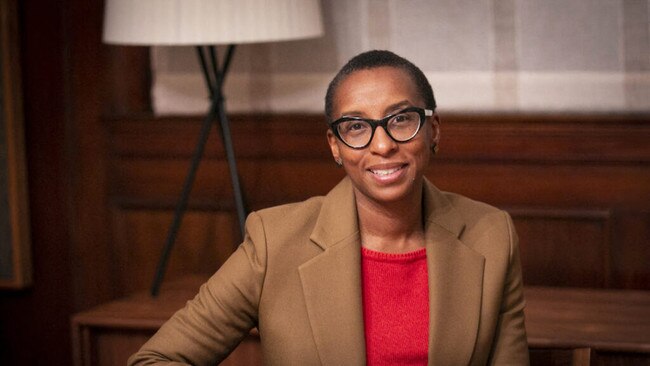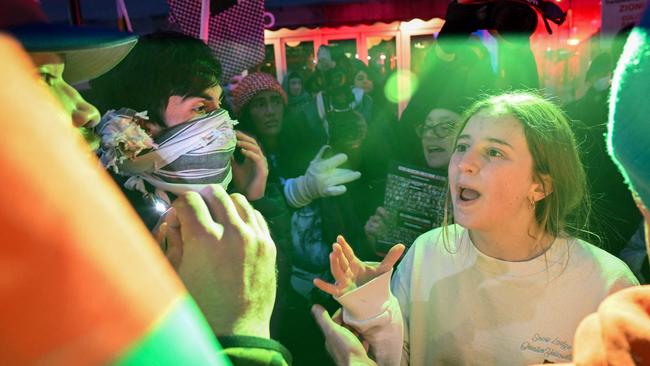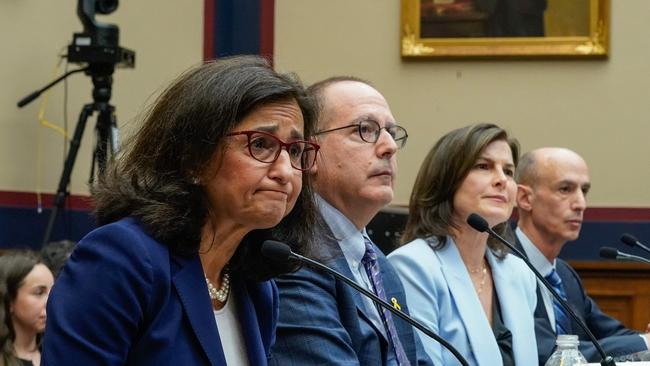Columbia University president Nemat Shafik condemns anti-Semitism on campus
The latest top US university faced with claims of anti-Semitism on campus since the Gaza war started was not prepared for the unrest, says its president.

Columbia University president Nemat “Minouche” Shafik told a US congressional committee on Wednesday that the university wasn’t prepared for the firestorm stemming from Hamas’s attack on Israel last year, which has led to numerous protests, instances of anti-Semitism, and claims by Jewish students that they feel unsafe on campus.
“When I first started at Columbia, our policies, our systems, and our enforcement mechanisms were not up to the scale of this challenge,” Professor Shafik said. “They were designed for a very different world.”
Professor Shafik, who became Columbia’s president last July, faced scores of pointed questions from committee members critical of the university’s response to instances of anti-Semitism on campus since the outbreak of war in the Middle East last October.
The questions were part of a 3½-hour hearing held by the House of Representatives committee on education and the workforce. The same committee in December elicited responses from two Ivy league presidents that led to their eventual resignations.
The fallout from the war in Gaza has been particularly intense on many college campuses, with many students torn over the October 7 attacks and Israel’s response. Universities have faced the challenge of balancing speech rights on the one hand with the rights of students to attend school without feeling harassed.
Jewish students at Columbia have alleged incidents of assault, anti-Semitic graffiti such as swastikas, calls for the destruction of Israel at rallies, and speaking invitations from student groups to members of foreign terrorist groups.

At the outset of the hearing, Republican Representative Virginia Foxx, the committee’s chairwoman, called Columbia one of the nation’s hotbeds of anti-Semitism. “Columbia stands guilty of gross negligence, at best, and at worst has become a platform for those supporting terrorism and violence against the Jewish people,” Ms Foxx said.
Committee members repeatedly probed decades of faculty attacks on Israel which they said had set the stage for the anti-Semitism that burst forth on campus after October 7. Professor Shafik responded that the school continues to ramp up processes to address anti-Semitism on campus and that professors who have expressed anti-Semitic viewpoints wouldn’t be hired under her watch.
The hearing comes four months after heated exchanges before the same committee prompted the resignations of Harvard president Claudine Gay and University of Pennsylvania president Elizabeth Magill.
At that hearing, lawyerly answers to questions asked by Republican Representative Elise Stefanik sparked a backlash from politicians, alumni and donors. Ms Magill resigned on December 9. Professor Gay stepped down a month later following accusations of plagiarism. Of the three university presidents at the hearing that day, only Massachusetts Institute of Technology’s Sally Kornbluth has retained her position.

Professor Shafik was invited to the December 5 hearing but was speaking at the United Nations Climate Change Conference in Dubai. She appeared on Wednesday morning with the co-chairs of the school’s board of trustees, Claire Shipman and David Greenwald, and David Schizer, a law professor and former dean of Columbia’s law school.
The four elite universities – Harvard, Penn, MIT and Columbia – all had experienced unrest on campus following the attack by Hamas on Israel. But so had many other campuses. The committee didn’t make clear why it called those four to testify.
During testimony on Wednesday, Professor Shafik and others emphasised the steps the school has taken since October 7 to clamp down on anti-Semitism.
Professor Shafik said the school has revised its policies on student behaviour and had suspended 15 students and put six on disciplinary probation for violating them. At the end of the hearing, Ms Foxx chastised Professor Shafik for misleading the committee and said only two students had been suspended.
Professor Shafik and the other Columbia officials also conceded the school has more work in front of it. “The last six months on campus have served as an extreme pressure test,” said Ms Shipman.
“Our systems clearly have not been equipped to manage the unfolding situation.” In their questions, some committee members focused on statements by professors attacking Israel, how they were hired and retained in positions of leadership.
Republican Representative Tim Walberg singled out Professor Joseph Massad, who teaches modern Arab politics at Columbia. According to Mr Walberg, Professor Massad called Israelis “cruel and bloodthirsty colonisers” and said foreigners who join the Israeli military are “baby killing Zionist Jewish volunteers for Israeli Jewish supremacy’’.
Professor Massad called Mr Walberg’s description of his work and words false and defamatory and said Professor Shafik’s insinuation that he had been reprimanded was false.
Ms Stefanik asked whether Professor Massad was still the department chair. “Do you stand behind Professor Massad remaining chair of the Academic Review Committee, giving his support for terrorism and harassing Jewish students?” she asked.
Professor Shafik said many of the faculty were hired before she arrived. “I think many of these appointments were made in the past in a different era,” she said.


Republican Representative Burgess Owens asked about the positive reaction some Columbia faculty allegedly expressed to the Hamas attacks.
“Would Black students be forced to attend a class if a Columbia professor was describing the massacre of Black men and women, children … as stunning, awesome and astonishing?” Mr Owens asked.
“What you’ve described, congressman, is completely unacceptable,” Professor Shafik said.

Anti-Semitic activity reported on college and university campuses increased in 2023 by 321 per cent from 2022, according to the Anti-Defamation League.
Meanwhile, the Council on American-Islamic Relations reported a 56 per cent increase in anti-Muslim incidents last year, the highest in its 30-year history.
Palestinian advocates say Columbia has been heavy handed in dealing with them – including suspending pro-Palestinian student groups. Across the country, advocates for Palestinians say schools are infringing on their speech rights for expressing their anger at Israel as the death toll in Gaza rises.
On Monday, the University of Southern California cancelled its valedictorian’s speech, to be given by a pro-Palestinian Muslim woman, citing security after she posted views opponents called anti-Semitic and anti-Zionist.
Testimony on Capitol Hill coincided with rallies around the country organised by local chapters of the American Association of University Professors.
Irene Mulvey, president of the AAUP, called the hearings “McCarthyism 2.0’’.
“The idea that faculty critical of Israel, or the policies of any country or government, can be punished or fired for their protected extramural speech is extremely dangerous,” she wrote in an email.
“Higher education is based on a robust exchange of ideas. Academic freedom includes the right to free speech.”
The house committee has cast a wider net since its first hearing. It held a roundtable with Jewish students from nine institutions in February, and in recent weeks sent letters requesting information on how the University of California, Berkeley, and Rutgers University have handled anti-Semitic incidents on their campuses.
A Berkeley spokesman said on Wednesday the school was responding to the committee’s requests and that it was focused on ensuring students on campus feel safe and respected.
Rutgers President Jonathan Holloway said in a letter last week to the committee that the university has worked to respond to all reported incidents of anti-Semitism, including with increased police patrols.
Leaders of public-school districts in New York City, Berkeley and Montgomery County, Maryland, are expected to testify at a hearing on anti-Semitism in K-12 education next month.
Melissa Korn contributed to this article.
The Wall Street Journal







To join the conversation, please log in. Don't have an account? Register
Join the conversation, you are commenting as Logout